Understanding the Vital Role of Funeral Professionals
What is an undertaker? An undertaker is a professional who prepares bodies for burial or cremation and manages funeral arrangements. This role, also known as a funeral director or mortician in modern terminology, combines technical expertise with compassionate care during one of life's most difficult transitions.
| Quick Facts About Undertakers |
|---|
| Definition: A professional who prepares deceased individuals for final disposition and arranges funeral services |
| Also Known As: Funeral director, mortician (modern terms) |
| Primary Duties: Body preparation, funeral planning, family support, legal documentation |
| Required Education: Associate degree in mortuary science, apprenticeship, state licensing |
| Average Salary: $58,310 median annual wage (as of 2019) |
The term "undertaker" dates back to the 1400s, originally referring to anyone who "undertook" a task or job. By the 1690s, it became specifically associated with funeral services, as these professionals "undertook" the responsibility of caring for the deceased and supporting grieving families.
Today's undertakers fulfill multiple roles that blend scientific knowledge, business management, and emotional support. They guide families through difficult decisions while handling the technical aspects of body preservation and funeral arrangements with dignity and respect.
Modern funeral professionals often work in small, family-run businesses, though about 15% of funeral homes in the United States are owned by larger corporations like Service Corporation International (SCI), which operates Dignity Memorial, or Carriage Services. The funeral industry also includes suppliers like Matthews International and Batesville Casket Company, who provide essential products to funeral homes. Regardless of business size, the core mission remains the same: providing compassionate care during life's most challenging moments.
I'm Mortuary Cooler, a national-level mortuary equipment supplier with extensive experience working with undertakers across the country to provide essential preservation equipment for their facilities. My work with funeral professionals has given me insight into what is an undertaker's daily responsibilities and technical needs.
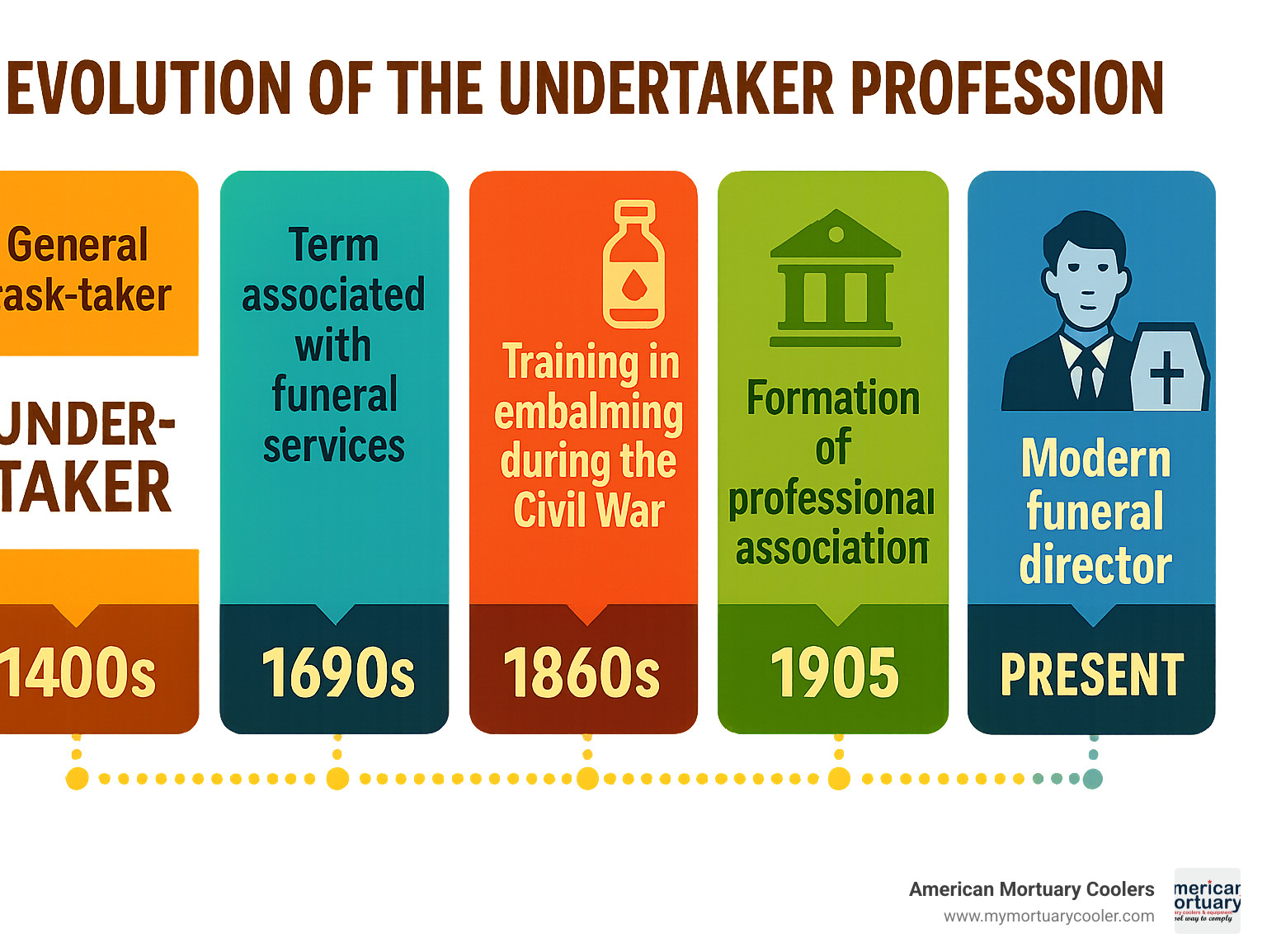
Key what is an undertaker vocabulary:
Why This Guide Matters
Whether you're a family facing the loss of a loved one or someone considering a career in funeral services, understanding the role of an undertaker is essential. For families navigating the grieving process, knowledge about what undertakers do can help explain funeral arrangements during an emotionally challenging time. For career seekers, this guide provides valuable insights into the professional requirements, daily responsibilities, and rewards of this unique vocation.
At American Mortuary Coolers, we work closely with funeral professionals across the country, from our headquarters in Tennessee to our service regions spanning from New York to Los Angeles. This nationwide perspective has given us unique insights into the evolving role of undertakers and the equipment they need to serve their communities with dignity and respect.
What Is an Undertaker? (Primary Keyword)
When people ask "what is an undertaker," they're inquiring about one of society's most essential yet often misunderstood professionals. An undertaker is a licensed professional who provides compassionate care for the deceased while offering crucial support to grieving families. Their responsibilities span from the moment of death through the final farewell—whether that's a burial or cremation.
While the Oxford Dictionary simply defines an undertaker as "someone who prepares bodies for burial or cremation and arranges funerals," this barely captures the depth and breadth of this meaningful vocation.
In contemporary American society, you'll more commonly hear the terms "funeral director" or "mortician" in professional circles, though all three titles essentially describe the same role. The heart of this profession remains consistent: providing dignified care for those who have passed while supporting those who remain.
"What is an undertaker" in Simple Terms
At its core, what is an undertaker boils down to someone who ensures our loved ones receive respectful, dignified care in their final journey. Their daily work involves:
Responding promptly when a death occurs, gently transporting the deceased to the funeral home with respect and care. They prepare the body through careful cleaning, embalming (when requested), dressing, and applying cosmetics to create a peaceful appearance. Undertakers arrange meaningful funeral or memorial services that honor the deceased's wishes and cultural traditions. They steer the maze of legal paperwork including death certificates and burial permits, sparing families this bureaucratic burden. Perhaps most importantly, they provide a steady, compassionate presence for families during an overwhelming time.
As one dedicated professional shared with me, "We don't just care for the dead—we help the living begin their healing journey. Every family deserves to be treated like our own family during life's most difficult moments."
"What is an undertaker" in Today's Funeral Homes
Modern undertakers typically work in specially designed funeral homes that balance technical necessities with comforting atmospheres. Despite industry consolidation, the majority of funeral establishments remain small, family-operated businesses—often employing just two or three professionals, frequently family members working together across generations.
While approximately 15% of funeral homes now operate under corporate ownership through companies like Service Corporation International (SCI) and Carriage Services, these businesses typically maintain their original family names and local character. This preservation of identity helps maintain community trust that may span decades or even centuries.
The funeral industry also includes major suppliers like Matthews International, which provides caskets and memorial products, and Thacker Caskets, which offers a range of burial options. While these companies compete with American Mortuary Coolers in the broader funeral supply market, they focus on different product categories than our specialized refrigeration equipment.
Today's funeral facilities have evolved to include thoughtfully designed spaces: preparation rooms equipped with specialized tools for dignified body care; warm consultation rooms where families can make arrangements without feeling rushed; serene viewing rooms and chapels for services; tasteful selection rooms for choosing caskets, urns, and memorial items; and professional vehicle fleets including hearses and flower cars.
At American Mortuary Coolers, we've had the privilege of working with funeral homes across the country—from historic New England establishments in centuries-old buildings to sleek, contemporary facilities in the Southwest. This nationwide perspective has shown us how undertakers blend tradition with innovation to serve their unique communities with dignity and respect.
Key Duties and Responsibilities of an Undertaker
When people think of undertakers, they often picture the solemn figure standing at a funeral service. But the truth is, their work begins long before the ceremony and continues well after the final goodbyes. These professionals shoulder a remarkable range of responsibilities, all while providing a steady hand during life's most difficult moments.
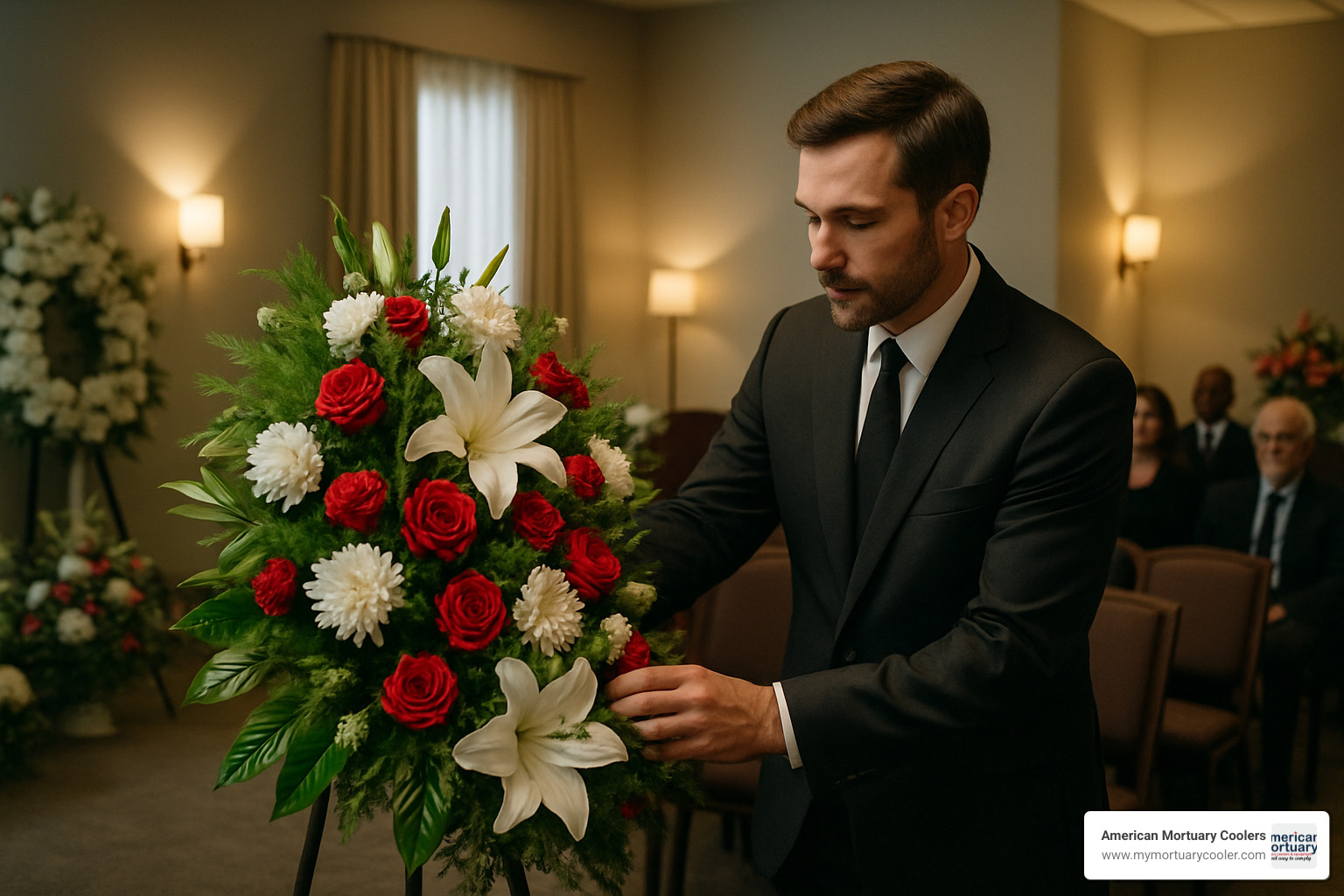
The journey begins with the first call—often in the middle of the night. Initial response and transport happens at all hours, as undertakers answer death calls with dignity and care, gently moving the deceased to the funeral home. This first step sets the tone for everything that follows.
Once at the funeral home, the undertaker begins the delicate work of body preparation. This includes washing and disinfecting, and may involve embalming, carefully dressing the deceased, styling their hair, and applying cosmetics to create a peaceful appearance. It's a profound act of care that many families find deeply comforting.
Funeral planning comes next, as the undertaker sits with grieving families, often around a table with tissues and coffee, guiding them through difficult decisions. They listen to stories, learn about the person who has died, and help create a meaningful tribute that honors a unique life.
"We wear many hats," explains an undertaker from our Atlanta network. "We're counselors one moment, event planners the next, and administrators throughout—all while helping families steer their grief. Every detail matters because we only get one chance to honor someone's life properly."
The undertaker then handles ceremony coordination, arranging every aspect of viewings, wakes, and funeral services. They work closely with clergy, musicians, and cemetery staff to ensure everything unfolds seamlessly. They also manage the essential legal documentation, preparing and filing death certificates and necessary permits with calm efficiency during a family's most overwhelming days.
Throughout this process, they help with product selection, guiding families through choices about caskets, urns, burial vaults, and memorial markers. Perhaps most importantly, they provide immediate grief support, offering a steady presence and connecting families with counseling resources for the journey ahead.
Behind-the-Scenes Technical Tasks
Much of what is an undertaker's work happens away from public view, requiring specialized knowledge and equipment that most people never see.
In the preparation room, refrigeration and preservation are essential first steps. At American Mortuary Coolers, we provide custom refrigeration units that maintain the optimal temperature range of 36°F to 39°F to slow natural decomposition with dignity and respect. While companies like Mopec and Mortech Manufacturing offer competing refrigeration solutions, our focus on customization and nationwide direct delivery sets us apart.
Embalming is a specialized skill that temporarily preserves the body by replacing blood with formaldehyde-based solutions. This process requires deep knowledge of anatomy, pathology, and chemistry—a science that's been refined since the Civil War era.
The art of restoration follows, as undertakers use cosmetics, wax, and other materials to create a peaceful, natural appearance. This becomes especially important after illness or trauma, allowing families to see their loved one at peace.
Throughout these processes, undertakers apply mortuary science principles to ensure proper sanitation and preservation. They skillfully operate specialized equipment like body lifts, embalming machines, and preparation tables—tools most people never see but that make dignified care possible.
Our team at American Mortuary Coolers works closely with funeral professionals to ensure they have proper refrigeration equipment for their preparation rooms. From portable body boxes for smaller facilities to walk-in coolers for larger operations, proper body storage is a critical foundation of funeral service.
Undertaker vs. Mortician vs. Embalmer vs. Funeral Director
Ever wondered why so many different titles exist for the person who helps us say goodbye to our loved ones? You're not alone. These terms often create confusion, and while many people use them interchangeably today, each title actually has its own unique history and subtle meaning.
| Title | Historical Origin | Original Meaning | Modern Usage |
|---|---|---|---|
| Undertaker | 1400s; funeral-specific by 1690s | One who "undertakes" the task of funeral arrangements | Less common today; sometimes considered old-fashioned |
| Embalmer | Became widespread after Civil War | Specialist who preserves bodies using chemicals | Technical specialist focused specifically on body preservation |
| Mortician | Late 1800s | Rebranding of "undertaker" to sound more professional (like "physician") | Common in the US; generally synonymous with funeral director |
| Funeral Director | Formalized by 1905 | Professional who manages all aspects of funeral services | Most common modern term; emphasizes comprehensive service management |
When you hear "undertaker," you might think of the WWE wrestler—or perhaps picture a solemn Victorian-era gentleman in a top hat. The term actually dates back centuries, originating as a simple description for someone who "undertook" responsibilities. By the late 1600s, it became specifically associated with those who handled funeral arrangements.
Why the Terminology Changed Over Time
The evolution of these professional titles tells a fascinating story about how our relationship with death—and the people who help us through it—has changed over time.
During the Victorian era, death became both more sentimental and more medicalized. Those working in the funeral trade wanted their profession to reflect the dignity and expertise their work required. In 1895, a trade magazine held a contest to create a more professional-sounding title. The winner? "Mortician"—cleverly combining the Latin root "mors" (death) with the "-ician" suffix that echoed respected professions like "physician."
"Most of us don't mind what families call us," shares a funeral professional from our Nashville service area. "The terminology might have changed, but our commitment to serving families with compassion during their most difficult moments remains exactly the same."
The shift to "funeral director" gained momentum in 1905 when the British Undertakers' Association renamed itself the National Association of Funeral Directors. This title emphasized the comprehensive management and coordination aspects of the role rather than just the handling of the deceased.
The term "embalmer" stands somewhat apart from the others. Its usage became widespread during the American Civil War, when embalming techniques allowed President Lincoln's body to be transported on a 1,645-mile funeral train journey. Today, an embalmer specifically focuses on the technical aspects of body preservation, while the other titles encompass broader responsibilities.
At American Mortuary Coolers, we're proud to work with funeral professionals of all titles across our service regions. Whether they call themselves undertakers, morticians, funeral directors, or embalmers, they all share a common mission: guiding families through loss with dignity and care. And they all need reliable equipment to fulfill that mission—which is exactly what we provide.
How to Become an Undertaker: Education, Licensing & Career Path
Becoming an undertaker is a journey that combines heart and science, requiring formal education, hands-on experience, and state certification. If you're considering this meaningful career path, here's what you should know:
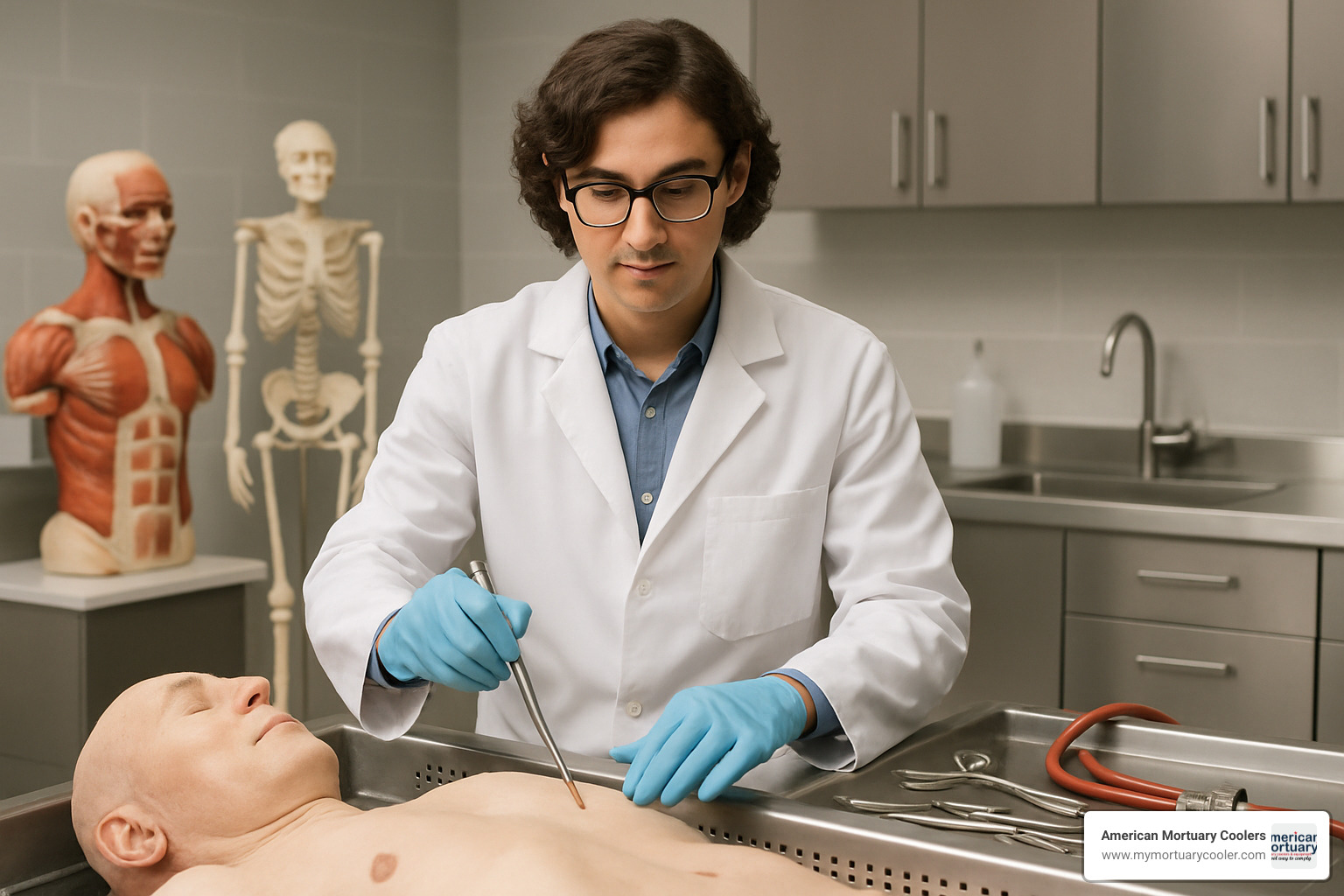
Most states require an associate degree in Funeral Service or Mortuary Science from an accredited program. These programs typically take 2-4 years and cover everything from the science of embalming to the psychology of grief. You'll study funeral law and ethics, develop counseling skills, learn business management, and understand the pathology behind your work.
After completing your education, you'll step into an apprenticeship lasting 1-3 years. This is where theory meets practice as you work alongside experienced professionals who guide you through real-world situations. Many of our clients at American Mortuary Coolers remember this period as challenging but invaluable—the time when they truly learned what it means to serve families with compassion.
The next hurdle is passing the National Board Examination administered by the Conference of Funeral Service Examining Boards, plus any state-specific tests. Once you've cleared these exams, you can apply for state licensure, though requirements vary across the country. And the learning never stops—most states require continuing education to maintain your license, keeping you current with evolving practices and regulations.
According to the Bureau of Labor Statistics, the future looks promising for funeral service professionals. The job outlook is projected to grow 8% from 2020 to 2030, with approximately 7,900 job openings annually. The financial outlook is solid too, with median annual wages of $74,000 for funeral directors and $48,950 for morticians, undertakers, and funeral arrangers.
Career Paths & Advancement
Once you've earned your license, a world of possibilities opens up. Many begin as funeral directors or embalmers, combining technical expertise with compassionate family service. This foundational role teaches you every aspect of funeral service from the ground up.
As you gain experience, you might find a passion for a particular aspect of the profession. Some undertakers become embalming specialists, focused on the art and science of preservation. Others excel as pre-need counselors, helping families plan ahead. Some find their calling in grief support, while others specialize in cremation services.
Career advancement often leads to management positions. You might become a senior funeral director, overseeing other staff members, or step into a funeral home manager role with broader responsibilities. In corporate settings, talented professionals can rise to regional management positions within companies like Service Corporation International or Carriage Services.
For many in the profession, ownership represents the ultimate goal. This might mean purchasing an existing funeral home, starting a new establishment, or joining a family business. We've worked with many funeral professionals at American Mortuary Coolers who have made this transition, helping them equip their facilities with the proper refrigeration systems as they take this significant step.
The skills you develop as an undertaker can also open doors to alternative career paths in related fields. Some professionals move into cemetery management, while others join the supplier side of the industry in roles like mortuary equipment sales. Some share their knowledge through funeral service education, and others provide consulting services to death care businesses.
Throughout our years serving funeral professionals across the country from our Tennessee headquarters, we've witnessed countless career journeys unfold. Whether you're just starting out or looking to expand your established funeral business, understanding the educational and career pathway is the first step toward making a difference in this essential profession.
Cultural, Historical and Future Perspectives
The undertaker’s craft has always mirrored the way societies think about death, evolving with each era’s beliefs and technologies.
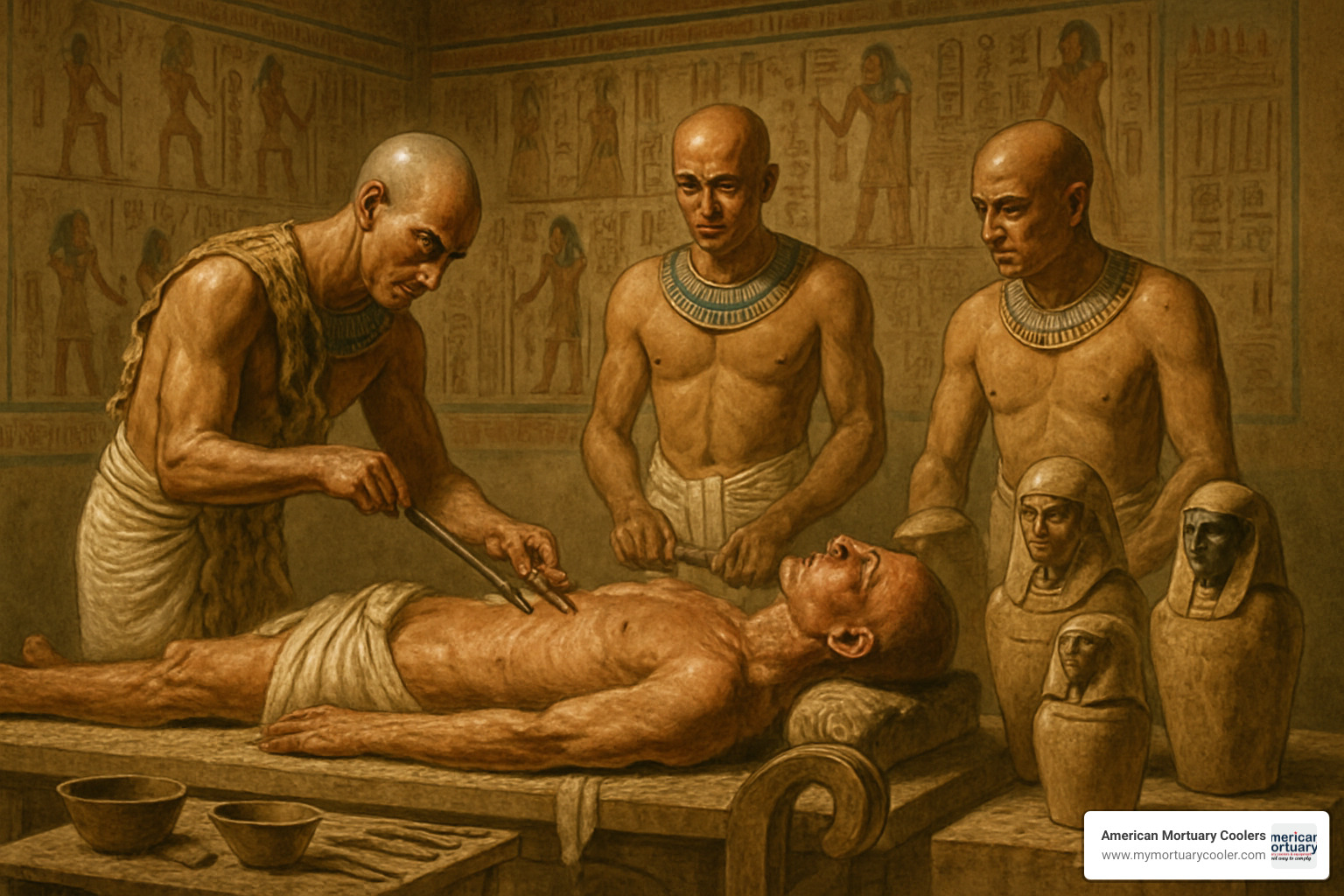
A Brief Historical Snapshot
- Ancient Egypt: priests devoted up to 70 days to mummification.
- Rome: hired mourners signaled social status in funeral processions.
- Middle Ages: church sextons and carpenters handled burials; families prepared bodies at home.
- 1690s: the word “undertaker” became linked exclusively to funeral work.
- U.S. Civil War: widespread embalming—famously used for President Lincoln—popularized open-casket viewings.
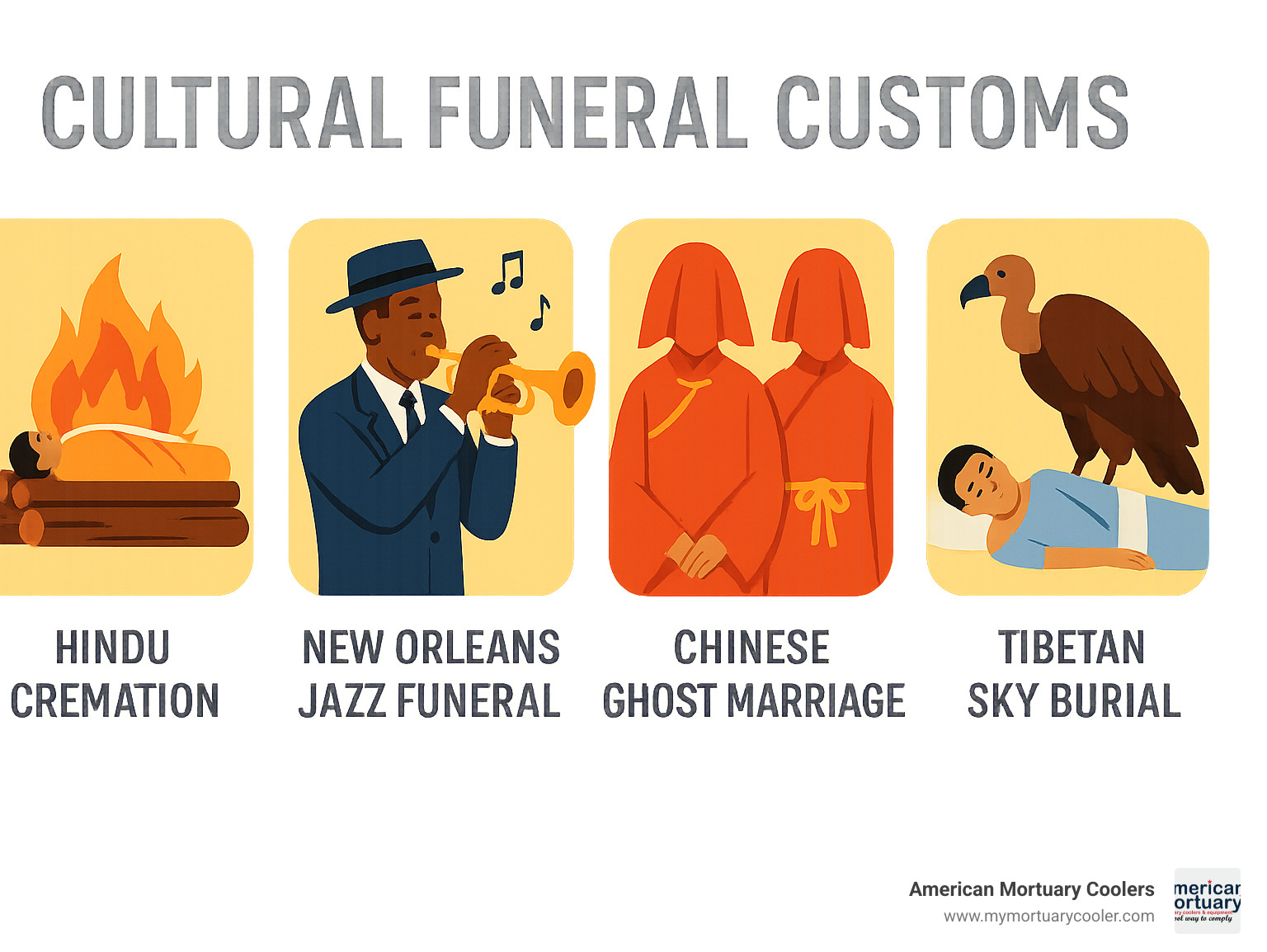
Modern Equipment & Innovations
Today’s undertakers rely on precision refrigeration instead of ice, refined embalming fluids for natural appearance, and ergonomic lifts that protect staff while ensuring dignity. Growing environmental awareness fuels demand for green burials, biodegradable caskets, alkaline hydrolysis, and even human composting where legal.
American Mortuary Coolers supports these advances with custom, energy-efficient refrigeration systems shipped directly to funeral homes across the contiguous United States. Explore the latest options in our Ultimate Guide to Funeral Undertaker Equipment Options.
Frequently Asked Questions About Undertakers
Do undertakers need to be licensed in every state?
Yes, undertakers (funeral directors) must be licensed in every state, though the specific requirements can differ quite a bit from one state to another.
Most states follow a similar path to licensure that includes completing an associate degree in mortuary science from an accredited program, followed by a hands-on apprenticeship lasting 1-3 years under an experienced funeral director's guidance. After this practical training, candidates must pass the National Board Examination and typically a state-specific law exam as well.
"The licensing process ensures that families receive care from qualified professionals during their most vulnerable moments," explains a funeral director from our network in Pennsylvania. "But it can be challenging when relocating between states with different requirements."
Some states maintain separate licenses for funeral directors and embalmers, while others offer a combined license that covers both roles. A handful of states have established reciprocity agreements that make it easier for licensed professionals to transfer their credentials when moving to a new state.
Once licensed, what is an undertaker's ongoing requirement? Continuing education is mandatory in most states to keep licenses current, ensuring funeral professionals stay updated on changing regulations and best practices.
How much do undertakers typically earn?
When it comes to compensation, an undertaker's earnings can vary widely based on several factors including geographic location, years of experience, and whether they work for a family-owned business or corporate funeral home.
Recent data shows that funeral directors earn a median annual wage of approximately $74,000, while those classified specifically as morticians, undertakers, and funeral arrangers earned a median of $48,950. Those who advance to management positions or ownership can often earn substantially more.
Location plays a significant role in salary expectations. A funeral director in our New York service region might earn considerably more than a counterpart in rural Tennessee, though the cost of living differs accordingly. Many funeral homes also offer benefits beyond base salary, including housing allowances (particularly common in small towns), health insurance, and retirement plans.
"This isn't a career you choose for the money," shares a veteran funeral director from our Midwest network. "The hours can be unpredictable, the emotional toll is real, but the sense of purpose makes it worthwhile. We're helping families through their darkest days—that's the true compensation."
Conclusion
The journey of the undertaker has taken us from its humble beginnings in the 1400s to the compassionate funeral professionals of today. While the name may have evolved—from undertaker to mortician to funeral director—the heart of this calling remains beautifully unchanged: honoring the dead and supporting the living through their darkest hours.
What makes today's undertakers so remarkable is their unique blend of skills. They're part scientist, part artist, part business manager, and part counselor—often wearing all these hats in a single day. They balance the technical precision of preservation with the gentle touch needed to guide a grieving family.
Death care continues to evolve, just as it always has. Modern undertakers now steer new territory from green burials to digital memorials, adapting their centuries-old profession to changing cultural needs while never losing sight of their core purpose: dignity and compassionate care.
While the funeral industry includes many players—from corporate entities like Service Corporation International to suppliers like Matthews International and Batesville—the heart of funeral service remains the dedicated professionals who work directly with families during their most vulnerable moments.
At American Mortuary Coolers, we feel privileged to stand alongside these dedicated professionals. From our manufacturing facility in Tennessee, we create the specialized refrigeration equipment that helps undertakers across the nation maintain the highest standards of care. Our mortuary coolers travel to funeral homes in all 48 contiguous states, becoming silent partners in this essential work.
For funeral professionals looking to improve their facilities with dependable, energy-efficient refrigeration, I encourage you to explore The Complete Guide to Funeral Home Coolers. Our custom solutions are designed specifically to improve your ability to serve families with the respect they deserve during their most vulnerable moments.
The work of an undertaker often happens behind closed doors, quietly and without fanfare. But its impact ripples through families and communities in profound ways. By creating space for meaningful goodbyes, funeral professionals lay the groundwork for healthy grieving—providing an essential service that touches us all eventually.
In the end, what is an undertaker if not a guardian of dignity at life's final threshold? They stand at the intersection of the living and the dead, helping us steer that difficult crossing with compassion, respect, and care. It's a calling unlike any other, and one that deserves our deepest appreciation.


















